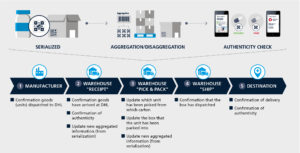DHL and Accenture trial blockchain-based pharma security program
DHL released a report in cooperation with Accenture that outlines blockchain’s “profound impact” on the logistics industry. However, the partners said that the industry will need to improve its collaboration before blockchain goes mainstream.
The two companies have also built a working prototype, which tracks pharmaceuticals from the point of origin to the consumer, preventing tampering and errors.
“We believe logistics is an area where the new technology [blockchain] will have a truly profound impact,” said Matthias Heutger, senior vice president DHL Customer Solutions & Innovation. He said that blockchain is ideally suited for the segmented logistics industry but noted that, “implementing productive solutions will require further technological development and, critically, collaboration between all stakeholders.”

Keith Turner, CIO chief development office, DHL Supply Chain said that the partnership focuses on pharmaceuticals because pharma shipment showed the most potential and is plagued with security gaps that counterfeiters take advantage of. “By utilizing the inherent irrefutability within blockchain technologies, we can make great strides in highlighting tampering, reducing the risk of counterfeits and actually saving lives.”
DHL and Accenture created a blockchain-based serialization prototype with nodes in six geographical regions to track pharmaceuticals across the supply chain. The ledger tracking these medicines may be shared with stakeholders, including manufacturers, warehouses, distributors, pharmacies, hospitals, and doctors. DHL ran lab-simulations that showed how blockchain could handle more than seven billion unique serial numbers and 1,500 transactions per second.




